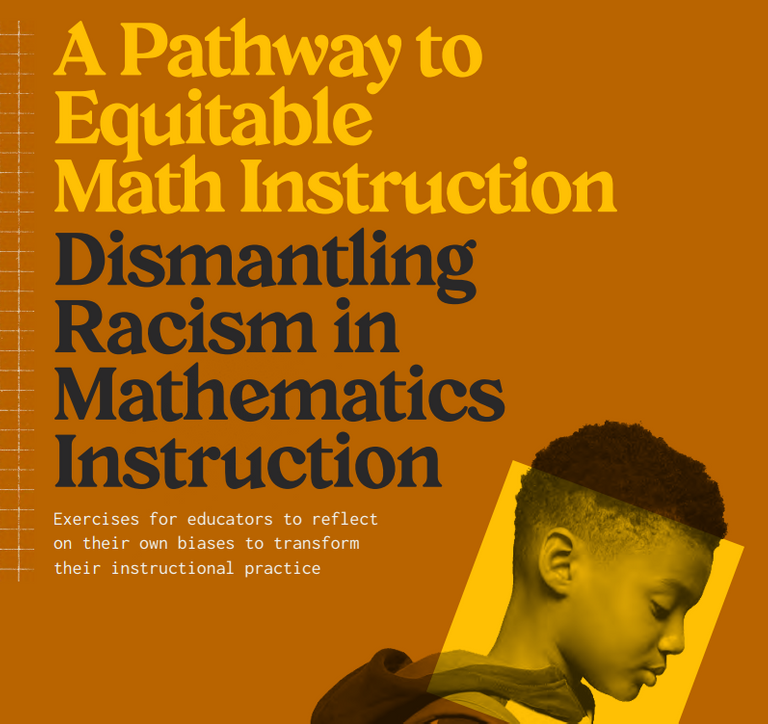Equitable Math Instruction?

Since February is Black History Month and I have a passion for helping people understand mathematics and the tools it provides for thinking about the world, I was intrigued by a suggestion I saw in a newsletter from the Oregon Department of Education. They suggest that teachers take a micro-course called "A Pathway to Equitable Math Instruction", the curriculum of which is available online.
https://equitablemath.org/wp-content/uploads/sites/2/2020/11/1_STRIDE1.pdf
Here are some of the things I learned. You may trust that everything I put into quotes is either verbatim or is lightly edited to remove internal quotation marks:
1) "White supremacy culture shows up in math classrooms when the focus is on getting the right answer".
2) "White supremacy culture shows up in math classrooms when independent practice is valued over teamwork or collaboration."
3) "White supremacy culture shows up in math classrooms when "real-world math” is valued over math in the real world. Often the emphasis is placed on learning math in the “real world” as if our classrooms are not a part of the real world. This reinforces notions of either/or thinking because math is only seen as useful when it is in a particular context. However, this can result in using mathematics to uphold capitalist and imperialist ways of being and understandings of the world"
4) Mentoring is an example of white supremacy culture, as is calling on students in class, as is asking students to raise their hand before they speak so that they don't talk over other people:
"White supremacy culture shows up in math classrooms when participation structures reinforce dominant ways of being. Classrooms are often microcosms of the world around us and reinforce dominant (or white) ways of being. For example, small groups of students receive the teacher’s attention throughout instruction and a few students are typically called on to participate in class discussions, reinforcing notions of perfectionism. The patterns of students who fall into those categories often mirror societal norms. Another common participation structure is pairing students as helper and helpee. This reinforces paternalism and other power structures that identify students as either being good or bad at math (also either/or thinking). Also, requiring students to raise their hand before speaking can reinforce paternalism and powerhoarding, in addition to breaking the process of thinking, learning, and communicating."
5) "White supremacy culture shows up in math classrooms when students are required to show their work. Math teachers ask students to show work so that teachers know what students are thinking, but that centers the teacher’s need to understand rather than student learning."
This wasn't promulgated by some whackjob far-left blog, this was encouraged by the Oregon Department of Education.
This is madness.
One of the most anti-racist things one can do in the 21st century is to help a child of color develop a love, skill, and intuition for mathematics. Identifying a quest for correct answers, or quiet time to think, or mentoring, or writing out your work as "white supremacist" is the exact opposite of that goal, and is all but certain to condemn that child to innumeracy.
There is so much work to be done in dismantling white supremacy, but this isn't it. If your child (of any color or gender) ever encounters the philosophy outlined above in school, I beg you to get them out of that classroom. Of all of the unfortunate ideas I've seen for teaching mathematics, this one stands out as singularly terrible.
Mathematics is a fundamentally creative endeavor. Having your child show their work helps them clarify and crystallize their own thinking, and give the teacher an opportunity to help them explore other avenues from which to examine the problem at hand. When I'm wrestling with a problem that is too complex to solve in my head, I show my work. The greatest mathematician who has ever lived, Ramanujan, showed his work. The greatest scientific minds that have walked this world, showed their work.
The ability to think mathematically, to have the mathematics available as one of the lenses through which to view the world around us, makes a person's life immeasurably richer. While I personally am just weird enough to enjoy mathematics for its own sake, I know that my girls' lives have been made richer by learning to see through that lens. We've spent time on the patio in the California sun talking and thinking about Bayes Theorem not so they can pass a test, but so they can think about questions like "What are the chances that the COVID-19 test result I just received is accurate?" We've spent hours talking and thinking about mathematics (usually in a comfortable setting, with snacks at hand) so we can talk about interest, and inflation, how animal populations vary in a surprising manner, what the stars are made of, how old the universe is, and why time and space behave in such strange ways.
We think about mathematics because it gives us not just ways of knowing, but ways of wondering.